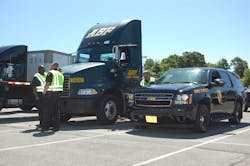Sticking closely to the rules of the Compliance Safety Accountability (CSA) program is vital in order for trucking companies and drivers alike to maintain a viable future in the freight hauling business, for acquiring even a modest series of CSA violations can “entrap” both in an enforcement web that can almost impossible to escape.
That’s one of the lessons shared during a CSA-focused trucking panel at the 2014 McLeod Software User Conference this week, being held at the National Harbor resort located just outside Washington D.C.
Robert “Rob” Bowman, president of R&L Truckload and R&L Global, Dwight Bassett, senior VP and CFO for flatbed carrier Boyd Brothers Transportation, and Harry Kimball, director of safety for refrigerated carrier Transco Lines, shared a variety of insights gleaned from how they’ve integrated the CSA program’s rules into their safety guidelines over the past four years.
“Drivers especially need to understand how CSA violations impact them,” noted Bassett. “If you just get two or three CSA violations, you can’t work for a good carrier – and it is very easy to catch [a violation].”
That’s why, from Boyd’s perspective, it is critical for fleets to manage their CSA track record by points on a daily basis and not by their overall CSA score.
“Trying to figure out the algorithm used to calculate CSA scores is a waste of time,” Bassett said.
As a result, what Boyd does is track its total CSA points on a daily basis and then extrapolates them out on a trend line for the rest of the year to see if the fleet is moving in the right or wrong direction in terms of safety compliance.
“That is especially important when it comes to equipment,” Bassett stressed. “If you stop doing or slack off on drop yard checks, pre-trip inspections, and PMs [preventive maintenance], it’s amazing how fast you will be targeted for frequent inspection. That’s also true if you don’t closely watch your hours of service (HOS) logs, especially if you are not using ELDs [electronic logging devices].”
R&L’s Bowman echoed those points. “Once you let equipment slide, you get a rap,” he emphasized. “Then you’ll be pulled in more frequently for inspections and it will snowball from there. So you need to watch the trends and stay on top of maintenance of [CSA] will snowball on top of you.”
All three noted that making drivers an integral part of CSA compliance is critical.
Boyd, for example, pays out $100 to drivers for a clean roadside inspection.
R&L Truckload takes that a step further, though, by offering its drivers a monthly three cent to four cent per-mile bonus for exceeding safety compliance metrics – pennies that add up on average to an extra $300 to $400 per month based on the typical miles R&L drivers accrue.
Transco’s Kimball stressed, though, that carriers need to in his words “draw a line in the sand” in terms of their driver hiring and training standards.
“You can’t trade the [CSA scores] of 500 good drivers for one problem,” he pointed out. “Our job is to make drivers better and that means taking mediocre drivers and turning them into good and great drivers.”
He added that driving a truck remains a very tough profession, with drivers away from home and family for long stretches. “Much of the world cannot fathom the work they do and the lives they lead,” Kimball emphasized.
For that reason, if a driver contests a CSA score they received, Kimball believes it’s the fleet’s duty to back them up 100% if upon analysis the driver is in the right.
“If they are right, we’re going all the way with their complaint until they get a fair shake,” he explained. “They [the drivers] have to know that, if they are right, we’ll do everything in our power to back them up.”
That’s why collecting and maintaining CSA supporting documentation is so critical today, said Kimball: it’s the key to pursuing such efforts successfully.
In the end, R&L’s Bowman stressed that if carriers and drivers alike do all the “little things” in terms of proper safety procedures – the pre- and post-trip inspections, the frequent drop yard checks to ensure trucks and trailers are in good working order, adherence to HOS rules, etc. – in the long run, CSA compliance will be far easier to maintain.
“There are no ‘home runs’ in trucking; just a lot of base hits,” he explained. “That means you need to do the small things up front. It also gets down to making your drivers feel like part of the team to make sure those small things get done every day.”
About the Author
Sean Kilcarr
Editor in Chief
Sean Kilcarr is a former longtime FleetOwner senior editor who wrote for the publication from 2000 to 2018. He served as editor-in-chief from 2017 to 2018.

